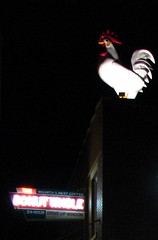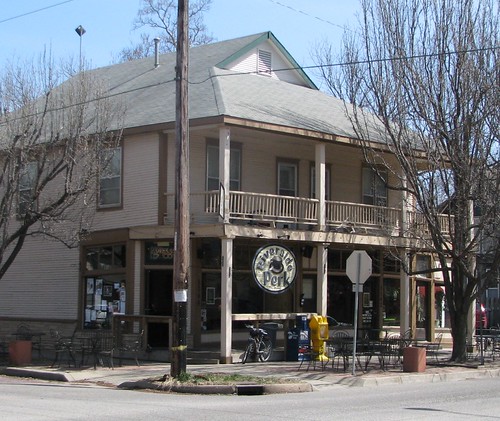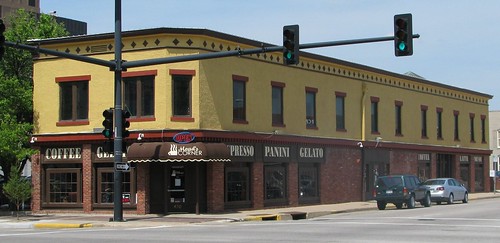Technology: April 2010 Archives
Business has had me in Wichita fairly often over the past few weeks. I was telling a friend about my recent sojourn, and she replied that she'd driven through Wichita a few times and couldn't "get on board with the whole Kansas thing." I'll admit that I didn't have a high opinion of Wichita before work brought me there. And the Kansas scenery as seen from the interstate gets a bit monotonous after a while.
For most Tulsans, Wichita is a place to drive through on your way to the ski slopes of Colorado. If you were to get off the highway, you'd find shady neighborhoods filled with late Victorian and craftsman homes, historic downtown buildings both big and small, and a warehouse district (Old Town) turned into a lively collection of restaurants, lofts, theaters, and hotels. But you have to get off the expressway to see it.
That's true in general of Kansas. If you get off the interstate and drive the old roads, you'll find pretty small cities and towns with well-preserved Main Streets and shady neighborhoods -- Emporia, Independence, Winfield, Arkansas City, Lindsborg, McPherson, Abilene, Chanute, Fort Scott -- to name just a few. I can better appreciate the beauty of open farmland if it's interrupted every so often by an attractive town.
Any time I travel, I try to make the opportunity to get out of the zone of chain hotels and chain restaurants and to get to know the city. I look for locally-owned restaurants and interesting neighborhoods, and I spend a lot of time on foot seeing what a city has done with (or, too often, to) its downtown.
One of the things I look for is a place to hang out -- a place with free WiFi, late hours, and something good to eat and drink, where they won't mind me sitting around to write code and blog entries for a few hours. I could work in my room, but that gets a bit lonesome after a while. And sometimes the hotel internet access is slow, or blocks VPN, or just doesn't work, so it's good to have an alternative.
While Tulsa has a great assortment of such places -- Coffee House on Cherry Street, Shades of Brown, Cosmo, to name a few -- I've had trouble finding such places in other cities. Wichita, on the other hand, is blessed with an abundance of great late night coffeehouses. As a bonus, most of them are conveniently located near I-135, so you can easily hop off for some caffeine and internet access on your way to Breckenridge.
Here are four worth a visit:
Riverside Perk: In a pretty late-1800s neighborhood in a bend of the Little Arkansas River, there's an old two-story wood-frame building at the corner of 11th & Bitting. The ground floor had a grocery store and a drug store once upon a time; today it's a coffeehouse and a wonderful neighborhood gathering place. You can sip your coffee and work on your laptop at a big diner booth and look out the big front windows to the big front porch and shaded sidewalk tables. A smoothie bar in the next room offers bar seating with a tiki theme. Riverside offers a great assortment of specialty drinks and food, including pizza bagels and sandwiches. They're open until 10 weeknights, midnight on weekends, when they have live music. Before or after your coffee, it's a pretty neighborhood for a stroll. From the interstate: From I-135, take the 13th St. exit and head west about a mile and a half, past the spectacular art deco Wichita North high school and across the art deco Minisa Bridge to a light at Bitting Ave. Left (south) on Bitting, across another bridge, then two blocks to 11th St.

The Donut Whole: A rooster stands sentinel on the roof of the sturdy brick building on Douglas between Hydraulic and I-135. Two rooms are connected by a narrow hallway. The room close to the street has roomy diner booths and a stage for weekend live music. The room at the back houses the coffee and the donuts, an old pinball machine ("Airport" by Gottlieb) -- two plays, five balls each, for 25 cents. A yellow Anco wiper blade display serves as the condiment table, next to a Lions Club park fountain on a pedestal. In the corner is Seeburg 100 jukebox (for sale), sitting under an old Fair-Play basketball scoreboard. Eclectic music (Django Reinhardt, The Price Is Right theme, early Beatles) fills the air. The coffee is excellent, and the assortment of donuts is astounding: choco crunch, Homer J., peanut butter cup, creamy orange, fluffernutter, thick mint, sunshine citrus crunch, peanut butter and grape, and triple bacon, to name just a small sampling. There's a cooler full of specialty sodas like Boylan's and Mexican Coca-Cola. Open 6 am to midnight, live music on the weekends, drive-thru open 24/7. From the interstate: Easiest coffeehouse to reach from the highway. From I-135, take the 1st/2nd St exit and head west on 2nd about two blocks to Hydraulic. Left (south) on Hydraulic two blocks to Douglas, then left again (east) and look for the rooster on the roof on the north side of the street. Parking available alongside the building.
Mead's Corner: This coffeehouse on Douglas at Emporia downtown offers coffee, specialty drinks, tea, gelato, pastries, and sandwiches, wraps, panini, and salads. Lots of room -- the coffeehouse takes up the entire first floor of an old commercial building -- with different types of seating, and great views of the other historic buildings nearby. Mead's Corner is owned and operated by First United Methodist Church, but it's not a haphazard "ministry" but is in fact run very professionally. (I'm sorry to say I've known of other church-related coffeehouses with very limited schedules and poor-quality coffee.) At the same time, it provides a comfortable venue for spiritual discussions, as well as the usual coffeehouse assortment of live music, poetry slams, etc. Mead's opens at 7 am Mondays through Saturdays until 10 weeknights, midnight on the weekends. Sunday hours are shorter: 10 am to 6 pm. From the interstate: From I-135, take the 1st/2nd St exit and head west on 2nd. You'll go through Old Town, under the Santa Fe tracks, then make a left on St. Francis. Go two blocks to Douglas, turn right and go one block west to Emporia. Street parking is free -- up to two hours during the day.
Poetic Justice: This one's different -- not near downtown, but in a strip center on the eastern edge of Wichita at Webb and Central on Greenwich north of Kellogg, very near the Beechcraft Hawker aircraft factory. It's also convenient to the hotel cluster near the I-35 Kellogg exit. Everything seems very new and neat. They sponsor weekly game nights (Wed), craft nights (Thurs), and open mike poetry nights (Fri). Open 9 am to midnight M-F, 10 to midnight Saturday, and closed Sunday. From the interstate: From Kellogg Ave (US 54-400), head north on Greenwich Rd; the cafe is just a few blocks north on the east side of Greenwich. Greenwich Rd is just a little over a mile east of the Kansas Turnpike (I-35) Kellogg exit. (UPDATED to reflect Poetic Justice's new location.)
Free WiFi seems to be getting more and more common. Spangles, a local '50s-themed fast food chain, has WiFi and late hours, as does Emerson Biggins, a local sports bar chain. I spent an evening at Pacific Coast Pizza enjoying a Fresno pizza and watching a TMAPC PLANiTULSA hearing on TGOV. There's a Village Inn on Rock Rd. with WiFi, new decor, and a new logo -- the restaurant's initials in lowercase sans-serif -- it ought to attract Unix developers.
Past entries on Wichita and Kansas:
The lonesome road to Wichita (alternatives to I-35)
Places to see in Wichita (including the amazing Orpheum Theater
A FUN-FUL evening in beautiful Kansas (Riverside Park in Independence)
Independence, Kansas, is FUN-FUL
A happy place in Kansas (College Hill Coffee in Winfield)
Useful sites for finding free WiFi:
IndieCoffeeHouses.com -- a Google-maps based, crowdsourced database of independent coffeehouses.
WiFiFreeSpot.com
OpenWifiSpots.com
Hotspotr.com
I saw an article today that made me aware of a missed opportunity. Yesterday was the 40th anniversary of the safe return to Earth of Apollo 13, and the Cosmosphere -- just a short four hours from Tulsa in Hutchinson, Kansas, and home to the mission's command module, Odyssey, hosted a reunion of Apollo 13 flight crew and mission control. Apollo 13 astronauts Jim Lovell and Fred Haise, flight director Gene Kranz, capcom Jack Lousma, Apollo 12 astronaut Alan Bean, and a host of the men behind the consoles in mission control were in attendance.
After kicking myself for a while for not knowing about this opportunity and making plans to be there, I read a news story about the festivities, which included a panel discussion among ground personnel:
But there were a few things that home viewers couldn't really understand, the men who were there said.For the astronauts, it was the numbing cold in the spaceship, which had been powered down to a minimal level to preserve its batteries. Lovell said the temperature dropped to the low 30s -- about the same as a home refrigerator.
And although the networks broadcast hours of footage from Mission Control, it couldn't capture the smell of the room, said flight controller Ed Fendell.
With the team in full emergency mode, "nobody bathed and everybody smoked," Fendell recalled. "The smell was overwhelming. You opened the door and smoke would come out."
It was the smell of determination.
The NASA veterans spoke about the future as well as the past, specifically the future of America's manned spaceflight program as redirected by President Obama:
Eugene Kranz, Apollo 13's flight director, drew cheers when he said he thinks Obama "wrote the epitaph for manned space flight" by the United States in February when he announced plans to scrap the Constellation project....The Apollo veterans said Constellation would have given NASA the opportunity to learn more about how to live long-term in space before embarking on a lengthy Mars mission.
Haise and Lovell said they disagree with the president's plan, which they said doesn't contain the kind of solid blueprint and preparation it took to send men to the moon.
"I looked at what he plans on doing and then I listened to his speech... building a heavy-lift booster and going out to the asteroids and eventually going to Mars and all that, but there was no continuity to it, there was no substance to what he was saying," Lovell said.
He predicted that the Russians will essentially inherit the International Space Station because American astronauts won't have a way to get there.
"In the decades and decades that we have been sort of, you know, friendly antagonists in going into space, I think the Russians have finally won the space race," Lovell said.
Can a welfare state accomplish great things as a nation? It seems that great national achievements come from nations with liberty and entrepreneurial energy, and thus the wealth for conquering space or achieving military superiority, or from totalitarian nations that can focus scarce resources, even at the expense of the prosperity of their people, to attain an ambitious goal. (Of course, in the end the US prevailed over the totalitarian USSR, both in the race to the moon and in the Cold War here on earth.) The social democracies of Europe rode on American and Soviet spacecrafts but never launched a manned program of their own. Britain's global reach dwindled after World War II and Clement Attlee's premiership. The apex of America's space program came just as the Great Society spending and dependency machine was getting warmed up.
Once a society reaches the point where a majority of voters are getting more from government than they've paid in, there's a change of mindset. There's more political advantage to growing entitlement programs than funding exploration or military strength or leaving more money in the hands of the private sector. In such circumstances, the ambitious leave for places where there is scope for their ambitions. For most of the 20th century, America has been a destination for those ambitious folks, and their intellectual capital has only added to our prosperity.
President Obama and his supporters seem uncomfortable with an America of great achievements, great influence, and great power. Take Obama's comment at the recent nuclear security summit: "...whether we like it or not, we remain a dominant military superpower...." The comment inspired blogger Doctor Zero to coin the term "Hospice America":
What other nation, beyond the Western democracies, would not like it? Everyone from heavyweight contenders like China, to the comeback empire of Russia, down to nasty little street fighters like North Korea and Iran would love to be dominant military superpowers. Their dreams include detailed plans for using that power, should they ever acquire it.... It was a far cry from the way someone like JFK or Reagan would address the same topic. They would have seen the responsibility of power as a challenge we should rise to meet, with confidence and determination, and offered thanks to God that America is the nation entrusted with this challenge.
Sadly, the America of new frontiers and bright mornings was long ago. Today we live in Hospice America, where caretakers with first-class temperaments and sharply creased trousers make us comfortable in the face of inevitable decline... and forward the bills for our end-of-greatness care to our children, who will go bankrupt paying them....
Muscular foreign policy is an expense Hospice America can't afford, and a distraction from the more urgent business of keeping its clients sedated and nourished. They're too feeble to handle their own finances, or manage their own health insurance. A modest unemployment allowance is provided for them, paid from cash advances on Uncle Sam's credit cards, because they can't really find work on their own any more. Genuine freedom and independence have been dismissed as unworkable. Instead, our congressional candy-stripers will quietly relieve their clients of meaningful decision making, while gently congratulating them on how "free" and "independent" they are.
MORE: Last week Obama gave a speech at the Kennedy Space Center about the future of America's manned space program. Excluded from the speech were the people whose livelihood and dreams are most closely tied to that future, and it outraged NBC correspondent Jay Barbree:
I just found out some very disturbing news. The President came down here in his campaign and told these 15,000 workers here at the Space Center that if they would vote for him, that he would protect their jobs. 9,000 of them are about to lose their job. He is speaking before 200, extra hundred people here today only. It's invitation only. He has not invited a single space worker from this space port to attend. It's only academics and other high officials from outside of the country. Not one of them is invited to hear the President of the United States, on their own space port, speak today.

